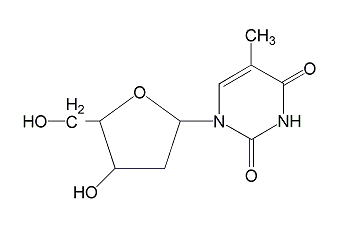
Structural formula
| Business number | 014A |
|---|---|
| Molecular formula | C10H14N2O5 |
| Molecular weight | 242.23 |
| label |
β-Thymidine, 2′-deoxythymidine, β-Thymidine, 1-(2-Deoxy-β-D-ribofuranosyl)-5-methyluracil, 1-(2-Deoxy-β-D-ribofuranosyl)thymine, 2′-Deoxythymidine, dT, Thymine deoxyriboside, For nucleic acid synthesis |
Numbering system
CAS number:50-89-5
MDL number:MFCD00006537
EINECS number:200-070-4
RTECS number:XP2071000
BRN number:89285
PubChem number:24899996
Physical property data
1. Properties: white needle-like crystalline powder.
2. Density (g/mL, 25/4℃): Undetermined
3. Relative vapor density (g/mL, air=1): Undetermined
4. Melting point (ºC): 185
5. Boiling point (ºC, normal pressure): Undetermined
6. Boiling point (ºC, 5.2kPa): Undetermined
7. Refractive index: Undetermined
8. Flash point (ºC): Undetermined
9. Specific rotation (º): [α] D25 +30.6° (C=1.029)
10. Autoignition point or ignition temperature (ºC): Undetermined
11. Vapor pressure (kPa, 25ºC): Undetermined
12. Saturated vapor pressure (kPa, 60ºC): Undetermined
13. Heat of combustion (KJ/mol) : Undetermined
14. Critical temperature (ºC): Undetermined
15. Critical pressure (KPa): Undetermined
16. Oil and water (octanol /water) logarithmic value of the distribution coefficient: Undetermined
17. Explosion upper limit (%, V/V): Undetermined
18. Explosion lower limit (%, V/V) : Undetermined
19. Solubility: Soluble in water, methanol, hot ethanol, hot acetone, hot ethyl acetate, pyridine and glacial acetic acid, slightly soluble in hot chloroform.
Toxicological data
None
Ecological data
None
Molecular structure data
1. Molar refractive index: 55.84
2. Molar volume (cm3/mol): 89.2
3. Isotonic specific volume (90.2K ): 166.7
4. Surface tension (dyne/cm): 62.2
5. Polarizability (10-24cm3): 22.13
Compute chemical data
1. Hydrophobic parameter calculation reference value (XlogP): -1.2
2. Number of hydrogen bond donors: 3
3. Number of hydrogen bond acceptors: 5
p>
4. Number of rotatable chemical bonds: 2
5. Number of tautomers: 3
6. Topological molecular polar surface area (TPSA): 99.1
7. Number of heavy atoms: 17
8. Surface charge: 0
9. Complexity: 381
10. Isotopic atoms Quantity: 0
11. Determine the number of atomic stereocenters: 3
12. Uncertain number of atomic stereocenters: 0
13. Determine chemical bond positions Number of stereocenters: 0
14. Number of uncertain chemical bond stereocenters: 0
15. Number of covalent bond units: 1
Properties and stability
None
Storage method
This product should be kept sealed and dry.
Synthesis method
None
Purpose
Used as pharmaceutical intermediates for the synthesis of antiviral and anti-HIV drugs
extended-reading:https://www.cyclohexylamine.net/dabco-t-12-tin-catalyst-dabco-t-12-catalyst-t-12/extended-reading:https://www.bdmaee.net/jeffcat-zf-24-catalyst-cas3033-62-3-huntsman/extended-reading:https://www.bdmaee.net/dabco-k-15-catalyst-cas3164-85-0-evonik-germany/extended-reading:https://www.cyclohexylamine.net/addocat-so-niax-d-19-pc-cat-t9/extended-reading:https://www.morpholine.org/103-83-3/extended-reading:https://www.bdmaee.net/nn-dimethyl-ethanolamine-2/extended-reading:https://www.cyclohexylamine.net/dabco-blx-11-polyurethane-foaming-catalyst/extended-reading:https://www.newtopchem.com/archives/40004extended-reading:https://www.bdmaee.net/wp-content/uploads/2022/08/N-N-Dimethylethanolamine-CAS108-01-0-2-Dimethylamineethanol.pdfextended-reading:https://www.newtopchem.com/archives/526